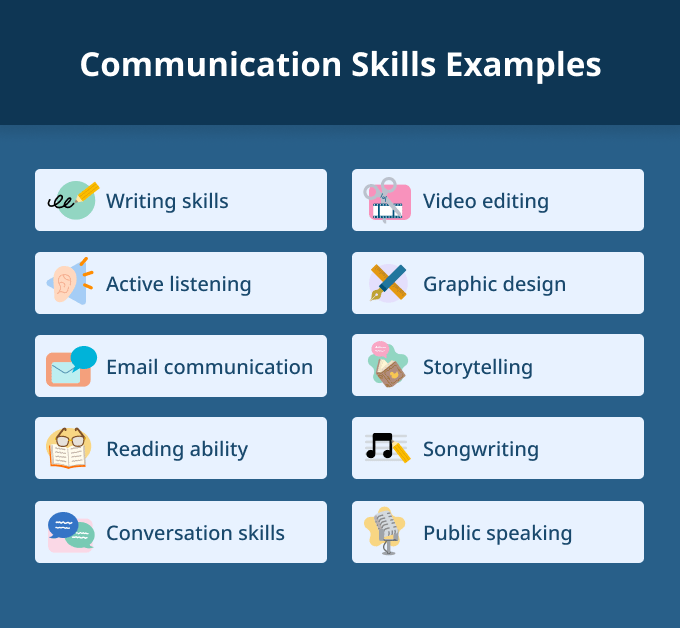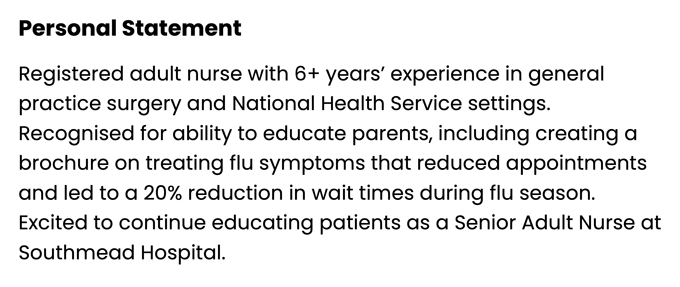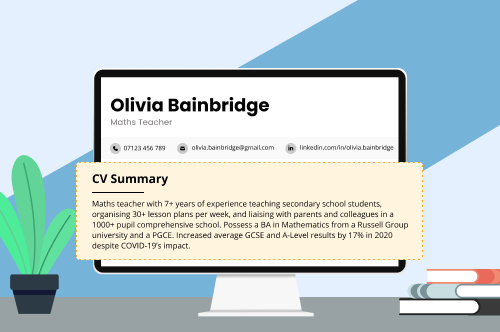What are communication skills?
Communication skills are the CV skills necessary so that you can convey information to others. Here are good communication skills examples:

Now that you know what communication skills are, keep scrolling to see:
- communication skills examples
- how to add communication skills to your CV
- how to describe communication skills in your cover letter
- how to prove your communication skills in job interviews
- how to improve communication skills
Communication skills examples
Below are examples of different types of communication skills, followed by examples of communication skills for specific industries:
Types of communication skills
Communication skills can be broken up into two categories:
- Verbal communication: Using words to communicate with others is called verbal communication. When you write an article or speak up in a brainstorming session, you’re using your verbal communication skills.
- Nonverbal communication: Many forms of communication don’t require words — a smile, for instance, or a picture that conveys a feeling without spoken or written words.
Here are examples of verbal and nonverbal communication skills that are useful for both your career and your personal life:
Communication skills examples for specific industries
The type of work you do determines which of your communication skills you’ll use the most. Click on the industry below that best matches your target job to see examples of communication skills that you’ll need:
- Healthcare
- Business & marketing
- Education
- Customer service
- Creative fields & entertainment
- Finance
- Engineering & IT
Communication in healthcare
Whether you’re a nurse or a doctor you’ll need a specific set of communication skills to provide good healthcare, including:
- a reassuring bedside manner
- objectivity
- clarity (for communicating precise information to patients and coworkers)
- empathy
- ability to remain calm and calm others during crises
Business & marketing communication
Working in business or marketing requires a lot of interaction with others, including coworkers, managers, and clients. So communication skills like these are essential:
- Branding
- Persuasion
- Digital communication
- Business writing
- Negotiation
Communicating as an educator
Communicating concepts to others is what educators do. Here are some specific examples of the type of communication skills you’ll need to work in education, whether you’re a school teacher or a dance instructor:
- Presentation skills
- Humour
- Demonstration (e.g., a football coach showing their team proper techniques)
- Relationship building
- Ability to adapt messages for different learning styles
Customer service communication
If you work in customer service, your job is built on using communication skills like these:
- Phone etiquette
- Friendliness
- Conversation skills
- an upbeat demeanour
- Conflict resolution
Communication in creative fields & entertainment
Entertainers and other creatives — from visual artists to graphic designers — use various forms of communication. Here are communication skills that are essential for creative roles:
- Networking
- Stage presence
- Communicating through colours
- Giving and receiving feedback
- Voice projection
Communicating as a finance professional
Even if you’re an accountant or financial analyst who primarily works with numbers, you’ll need to be able to communicate about your work. These are good communication skills to have if you work in finance:
- Reporting skills
- Spreadsheets
- Data visualisation
- Attention to detail
- Interdepartmental communication
Engineering & IT communication
Good communication skills are important for people who work in technical fields, such as engineering and information technology (IT) because they’re often required to work with a diverse group of stakeholders, including clients, team members, and management. Below are examples of communication skills that engineers and IT professionals often use:
- Ability to interpret technical concepts for non-technical audiences
- Technical writing
- AI prompts
- Asking questions
- Patience
How to add communication skills to your CV
The best way to show your communication skills on your CV (the written summary of skills and experience you send the employer) is by giving examples throughout your CV of how you used them to achieve measurable results.
Here are three tips to help you write a good CV that highlights your communication skills:
Writing an English CV without native-level English? Ask a native-English speaker to look over your CV to ensure you’re communicating your experience and skills clearly to employers.
1. Put your most marketable communication skills in your personal statement
When are recruiter opens your CV, the first section they’ll see is your personal statement. So if the job advert emphasises a particular communication skill, place proof of that skill (if you have it) in your personal statement to grab the reader’s attention.
As an example, let’s say you’re applying for a nursing position, and the job posting indicates the employer prioritises applicants who have experience with patient education. Here’s an example of a personal statement that targets that job advert:

2. Emphasise your communication skills in your work experience section
Employers prefer to hire applicants who show that they’ve used their communication skills to make positive contributions to their previous companies. So present examples of your communication skills at work in your CV’s work experience section using hard numbers to show what you accomplished.
Here’s how the nursing applicant from above could tailor their bullets to their target job posting:

Not sure which communication skills employers will want to see in your work experience section? Using a high-quality CV maker that suggests job-specific bullet points is a great strategy for identifying ways you’ve applied your written and verbal skills in previous roles.
3. Add a mix of hard and soft communication skills
Remember to include a mix of both hard and soft communication skills on your CV to show that you’re a well-rounded applicant.
Hard competencies are skills that require training to develop, such as a software program. Soft abilities are connected to your personality — if you’re outgoing, that’s one of your most important soft skills.
These are examples of hard and soft communication skills to highlight in the sections you put on your CV:
Hard communication skills
- Remote communication software expertise (such as knowing how to share your screen during a video meeting)
- Graphic design and video programs
- PowerPoint skills
Soft communication skills
- Cultural awareness
- Charisma
- Honesty
How to describe communication skills in your cover letter
A great way to show employers you’re a good communicator is by writing an engaging cover letter.
Just like on your CV, you should include hard numbers to back up the communication skills you put in your cover letter. But the format of a cover letter allows you to provide extra details and examples of how you’ve successfully communicated with others in the workplace.
Here’s an example of a body paragraph from a nursing cover letter that highlights the applicant’s communication skills:
During my time as a Social Worker at Royal Borough of Greenwich, I developed a reputation for being able to connect with people from a wide range of backgrounds. As a result, I was entrusted with spearheading a monthly support group that encouraged cross-cultural communication between troubled youths.
Need ideas for how to describe your communication skills when you make a cover letter? Look at good cover letter examples online.
How to prove your communication skills during job interviews
Employers evaluate how well you communicate with them during interviews, but they’ll likely also ask you to talk about how you’ve used your communication skills in your current and past jobs.
When you discuss your communication skills in a job interview, expand on the information you provided on your CV and in your cover letter by giving more in-depth examples.
Asking questions in an interview is another way to show that you’re an excellent communicator. So research the company and think of several good questions to ask during your interview.
Below are good answers to three common interview questions about communication skills. Notice how the applicants give detailed examples and emphasise the results their communication skills produced wherever possible:
Tell us about a time you convinced someone to purchase a product.
I used to work at a department store in the stockroom. One day I was cleaning a spill in our appliance department, and a customer started asking me questions about a refrigerator on display. I didn’t see any sales associates nearby, and I had the same model at home, so I started talking up the features I most enjoyed, focusing on how the ice maker and adjustable racks solved pain points I’d had with my previous refrigerator.
The customer ended up buying not one but two models — one for their business, and one for home — and I was given the sales commission and promoted to sales associate.
Do you have any experience with public speaking?
While studying at university, I gave presentations of up to 45 minutes as part of my classes at least 3 times a semester. Additionally, I worked as a tour guide on the campus, leading groups of 20–30 prospective students around the campus, delivering presentations on the history of the university and the amenities currently offered. We had a general outline to follow, but I took pride in making my speeches engaging, resulting in a 45% rate of enrollment from my groups — the highest rate ever tracked by our recruiting department.
Have you ever had a communication breakdown at work, and if so, how did you resolve it?
When I worked at York Hospital, I had what I viewed as a minor disagreement with the head nurse. However, after our disagreement, she began speaking to me only when absolutely necessary and started giving me 4 overnight shifts per week, even though my seniority was supposed to give me priority for daytime work.
So I scheduled a one-on-one meeting with her and explained that I understood why she was upset with me and that I was sorry if I had offended her. After revisiting our contentious discussion, we discovered that we actually were mostly on the same page, and she had simply misunderstood where I was coming from. We left the meeting on good terms, my schedule reverted to normal, and she even recommended me as her replacement when she left to work at another hospital.
How to improve communication skills
Looking for ways to protect your career from economic ups and downs? Improving your communication skills is a great place to start. Here are four ideas for improving your communication abilities:
1. Take communication skills courses online
If you learn best in a structured online classroom environment, consider enrolling in further education courses. You can find a variety of courses for honing your communication ability on learning websites like:
2. Listen closely to (and mimic) good communicators
If you’re impressed by how well someone in your life communicates, observe them whenever you can, taking note of the tactics they use. Then apply what you learn to your own communication.
Don’t have anyone you can learn from at work or in your personal life? You can find great communicators to copy online by watching TED Talks or taking cues from your favourite podcaster.
3. Learn about nonverbal cues
Even if you’re not great at talking, you can improve your communication skills by enhancing your nonverbal communication.
For example, learn to express confidence through good posture, maintaining eye contact, and speaking clearly rather than mumbling. And you can learn how to better interact with people by paying close attention to what others are communicating through nonverbal cues.
To improve your nonverbal communication, you can:
- take online courses
- read books and articles
- copy great communicators
And to ensure that you apply what you learn, video yourself communicating (for instance, record a presentation or watch a Zoom meeting replay) to see what you’re doing well and what needs work.
4. Practise communicating
You can study all you want about communicating, but the true test of your ability comes when you put it into practice. So find opportunities to communicate, such as:
- attending networking events and requiring yourself to talk to a certain number of people
- joining Toastmasters
- speaking up in meetings or courses
- editing your texts and emails for clarity and conciseness
Common questions about communication skills
Want to know even more about communication? We’ve answered three of the most common questions people ask about communication skills below:
- What’s the difference between interpersonal and communication skills?
- Why are communication skills important in the workplace?
- How do you say you have good communication skills?
1. What’s the difference between interpersonal and communication skills?
Interpersonal skills are abilities that help you build relationships and interact with others. Many forms of communication require direct interaction between people, so interpersonal skills are a subset of the broader communication skills category.
2. Why are communication skills important in the workplace?
Communication skills are important in the workplace because every task requires communication with coworkers, managers, or clients. If communication in a workplace is unclear (or nonexistent), the work done there will be subpar or even stop altogether.
3. How do you say you have good communication skills?
To say you have good communication skills, you should:
- discuss examples of times you used your communication skills to accomplish something
- demonstrate your communication skills as you talk by avoiding filler words, maintaining good posture, and speaking clearly




